- Home
- Frederick Marryat
The Mission Page 6
The Mission Read online
Page 6
CHAPTER V.
The next day the ship was off Rio, and immediately sent her boats forprovisions and supplies; the passengers did not land, as the captainstated that he would not stay an hour longer than was necessary, and onthe second evening after their arrival they again made sail for theCape.
The gulls were flying in numbers astern of the ship, darting down andseizing every thing edible which was thrown overboard, and theconversation turned upon aquatic birds.
"What difference is there in the feathers of aquatic birds and others?"inquired Alexander; "a hen, or any land bird, if it falls into thewater, is drowned as soon as its feathers are saturated with the water."
"There is, I believe, no difference in the feathers of the birds,"replied Mr. Swinton; "but all aquatic birds are provided with a smallreservoir, containing oil, with which they anoint their feathers, whichrenders them water-proof. If you will watch a duck pluming and dressingitself, you will find it continually turns its bill round to the end ofits back, just above the insertion of the tail; it is to procure thisoil, which, as it dresses its feathers that they may carefully overlapeach other, it smears upon them so as to render them impenetrable to thewater; but this requires frequent renewal, or the duck would be drownedas well as the hen."
"How long can a sea-bird remain at sea?"
"I should think not very long, although it has been supposed otherwise;but we do not know so much of the habits of these birds as of others."
"Can they remain long under water?"
"The greater portion of them can not; ducks and that class, forinstance. Divers can remain some time; but the birds that remain thelongest under water are the semi-aquatic, whose feet are onlyhalf-webbed. I have watched the common English water-hen for manyminutes walking along at the bottom of a stream, apparently as much inits element as if on shore, pecking and feeding as it walked."
"You say that aquatic birds can not remain long at sea,--where do theygo to?"
"They resort to the uninhabited islands over the globe, rocks thatalways remain above water, and the unfrequented shores of Africa andelsewhere; there they congregate to breed and bring up their young. Ihave seen twenty or thirty acres of land completely covered with thesebirds or their nests, wedged together as close as they could sit. Everyyear they resort to the same spot, which has probably been theirdomicile for centuries,--I might say since the creation. They make nonests, but merely scrape so as to form a shallow hole to deposit theireggs. The consequence of their always resorting to the same spot isthat, from the voidings of the birds and the remains of fish brought tofeed the young, a deposit is made over the whole surface, a fraction ofan inch every year, which by degrees increases until it is sometimestwenty or thirty feet deep, if not more, and the lower portion becomesalmost as hard as rock. The deposit is termed guano, and has, from timeimmemorial, been used by the Peruvians and Chilians as manure for theland; it is very powerful, as it contains most of the essential salts,such as ammonia, phosphates, etc., which are required for agriculture.Within these last few years samples have been brought to England, and asthe quantities must be inexhaustible, when they are sought for andfound, no doubt it may one day become a valuable article of our carryingtrade. Here comes Mr. Fairburn; I hope he intends to continue hisnotices of the Cape settlement."
"They have interested me very much, I must confess; he appears wellacquainted with the colony."
"He has had the advantage of a long residence, and during that time aninsight into all the public documents: this you may be certain of, thathe knows more than he will tell."
As soon as Mr. Fairburn joined them, Alexander requested him tocontinue his narrative, which he did as follows.
"You must not suppose, Mr. Wilmot, that because the English had nowpossession of the colony, every thing went right; governors who areappointed to the control of a colony require to be there some timebefore they can see with their own eyes; they must, from their want ofinformation, fall into the hands of some interested party or another,who will sway their councils. Thus it was at the Cape.
"It is true that much good had already been done by the abolition ofslavery and the emancipation of the Hottentot; but this was effected,not by the colonial government, but by the representations of themissionaries and an influential and benevolent party at home. Theprejudices against the Hottentots, and particularly the Caffres, stillexisted, and were imbibed by the colonial authorities. Commandoes, or,as they should be more properly termed, marauding parties, were stillsent out, and the Caffre was continually oppressed, and, in defiance ofthe government orders, little justice could be obtained for theHottentot, although his situation was somewhat improved.
"I will give one instance to show how the rights of the Hottentots wererespected by the Cape authorities in 1810,--previous to theemancipation, it is true, but still at a time when the position of theHottentots and their sufferings had been strenuously pressed upon thecolonial authorities by the government at home.
"When the conduct of the Dutch boors had roused the Caffres andHottentots to war, there were three brothers by the name of Stuurman,Hottentots, who were the leaders. Peace was at length restored, whichwas chiefly effected by the exertions of these men, who retiredpeaceably with their own kraal to Algoa Bay; and the government, beingthen Dutch, appointed Stuurman as captain of the kraal. This independenthorde of Hottentots gave great offense to the Dutch boors,--the more soas the three brothers had been the leaders of the Hottentots in theformer insurrection. For seven years they could find no complaint tomake against them, until at last two of his Hottentots, who had engagedto serve a boor for a certain time, went back to the kraal at theexpiration of the term, against the wish of the boor, who would havedetained them; the boor went and demanded them back, but Stuurmanrefused to give them up; upon which, although justice was clearly on theside of the Hottentots, an armed force was dispatched to the kraal.Stuurman still refused to surrender the men, and the armed men retired,for they knew the courage of the Hottentots, and were afraid to attackthem.
"By treachery they gained possession of Stuurman and one of his brothers(the other having been killed hunting the buffalo), and sent them toCape Town, from whence, against all justice, they were sent as prisonersto Robin Island, where malefactors are confined. They made their escape,and returned to Caffreland. Three years afterward, Stuurman, anxious tosee his family, returned to the colony without permission. He wasdiscovered and apprehended, and sent as a convict to New South Wales;for the government was at that time English.
"Such was the fate of the first Hottentot who stood up for the rights ofhis countrymen, and such was the conduct of the English colonialgovernment; so you will observe, Mr. Wilmot, that although the stridesof cruelty and oppression are most rapid, the return to even-handedjustice is equally slow. Eventually the gross injustice to this man wasacknowledged, for an order from the home government was procured for hisliberation and return; but it was too late,--Stuurman had died aconvict.
"I have mentioned this circumstance, as it will prepare you for asimilar act of injustice to the Caffres. When the colony was inpossession of the Dutch there was a space of about thirty thousandsquare miles between the colonial boundary (that is, the land formerlypossessed by the Hottentots) and the Great Fish River. This extent ofthirty thousand square miles belonged to the Caffres, and was the siteof continual skirmishing and marauding between the Dutch boors and theCaffres.
"In 1811 it was resolved by the colonial government that the Caffresshould be driven from this territory, and confined to the other side ofthe Great Fish River. This was an act of injustice and great hardship,and was proceeded in with extreme cruelty, the Caffres being obliged toleave all their crops, and turned out with great and unnecessaryslaughter.
"It may be proper, however, to state the causes which led to this Caffrewar with the English. At this time the colonial governor had enteredinto negotiations with a Caffre chief of the name of Gaika. He was achief of a portion of the Caffres, but not the principal chief, andalthou
gh the English treated with him as such, the Caffres would notacknowledge his authority. This is a very frequent error committed inour intercourse with savage nations, who are as pertinacious of theirrights as the monarchs of Europe. The error on our part was soondiscovered, but the government was too proud to acknowledge it.
"It so happened that the other Caffre chiefs formed a powerfulconfederacy against Gaika, who, trusting to the support of the English,had treated them with great arrogance. They fought and conquered him,carrying off, as usual, his cattle. As this was a war between theCaffres, and confined to their own land, we certainly had no business tointerfere; but the colonial government thought otherwise, and anexpedition was prepared.
"The Caffres sent forward messengers declaring their wish to remain atpeace with the English, but refusing to submit to Gaika, who was only asecondary chief, and whom they had conquered. No regard was paid to thisremonstrance; the English troops were sent forward, the Caffres attackedin their hamlets, slaughtered or driven into the woods, 23,000 head ofcattle taken from them, of which 9,000 were given to Gaika, and the restdistributed to the Dutch boors, or sold to defray part of the expensesof the expedition.
"Deprived of their means of subsistence by the capture of their cattle,the Caffres were rendered furious reckless, and no sooner had theexpedition returned, than they commenced hostilities. They poured intothe frontier districts, captured several detached military forts, drovethe Dutch boors from the Zurweld, or neutral territory, and killed agreat many of our soldiers and of the Dutch boors. All the country wasoverrun as far as the vicinity of Algoa Bay, and nothing could at firstcheck their progress."
"Why, it really does not appear that the colonial government, when inour hands, was more considerate than when it was held by the Dutch,"replied Alexander.
"Not much, I fear," said Mr. Fairburn.
"The councils of the Caffre chiefs were at that time much influenced bya most remarkable personage of the name of Mokanna. In the colony he wasusually known by the sobriquet of 'Links,' or the left-handed. He wasnot a chief, but had by his superior intellect obtained great power. Hegave himself out to be a prophet, and certainly showed quite as muchskill as ever did Mahommed or any other false prophet. He had oftenvisited Cape Town, and had made himself master of all that he couldacquire of European knowledge.
"This man, by his influence, his superior eloquence, and his pretendedrevelations from heaven, was now looked up to by the whole Caffrenation; and he promised the chiefs, if they would implicitly obey hisorders, he would lead them to victory, and that he would drive theEnglish into the ocean. He resolved upon the bold measure of making anattack upon Graham's Town, and marched an army of between nine and tenthousand men to the forest bordering on the Great Fish River.
"According to the custom of the Caffres, who never use surprise orambush on great occasions, they sent a message to the commandant ofGraham's Town, stating that they would breakfast with him the nextmorning. The commandant, who had supposed the message to be a merebravado, was very ill prepared when on the following morning heperceived, to his great astonishment, the whole force of the Caffres onthe heights above the town.
"Had the Caffres advanced in the night, there is no doubt but that theywould have had possession of the place, and that with the greatest ease.There were about 350 regular troops and a small force of Hottentots inGraham's Town, and fortunately a few field-pieces. The Caffres rushed tothe assault, and for some time were not to be checked; they went up tothe very muzzles of the field-pieces, and broke their spears off short,to decide the battle by a hand-to-hand conflict.
"At this critical moment, the field-pieces opened their fire of grapeand canister, and the front ranks of the Caffres were mowed down likegrass. After several rallyings under Mokanna, the Caffres gave way andfled. About 1400 of the bravest remained on the field of battle, and asmany more perished from their wounds before they could regain theircountry. Mokanna, after using every exertion, accompanied the Caffrearmy in their flight."
"It certainly was a bold attempt on the part of the Caffres, and showedMokanna to be a great man even in the failure."
"It was so unprecedented an attempt, that the colonial government weredreadfully alarmed, and turned out their whole force of militia as wellas of regular troops. The Caffre country was again overrun, theinhabitants destroyed, without distinction of age or sex, their hamletsfired, cattle driven away, and when they fled to the thickets, they werebombarded with shells and Congreve rockets. Mokanna and the principalchiefs were denounced as outlaws, and the inhabitants threatened withutter extermination if they did not deliver them up dead or alive.Although driven to despair, and perishing from want, not a single Caffrewas to be found who would earn the high reward offered for the surrenderof the chiefs."
"The more I hear of them, the more I admire the Caffres," observedAlexander Wilmot; "and I may add--but never mind, pray go on."
"I think I could supply the words which you have checked, Mr. Wilmot,but I will proceed, or dinner will be announced before I have finishedthis portion of my history."
"The course adopted by Mokanna under these circumstances was such aswill raise him much higher in your estimation. As he found that hiscountrymen were to be massacred until he and the other chiefs weredelivered up, dead or alive, he resolved to surrender himself as ahostage for his country. He sent a message to say that he would do so,and the next day, with a calm magnanimity that would have done honor toa Roman patriot, he came, unattended, to the English camp. His wordswere 'People say that I have occasioned this war: let me see if mydelivering myself up will restore peace to my country.' The commandingofficer, to whom he surrendered himself, immediately forwarded him as aprisoner to the colony."
"What became of him?"
"Of that hereafter; but I wish here to give you the substance of aspeech made by one of Mokanna's head men, who came after Mokanna'ssurrender into the English camp. I am told that the imperfect notestaken of it afford but a very faint idea of its eloquence; at allevents, the speech gives a very correct view of the treatment which theCaffres received from our hands.
"'This war,' said he, 'British chiefs, is an unjust one, for you aretrying to extirpate a people whom you have forced to take up arms. Whenour fathers and the fathers of the boors first settled on the Zurweld,they dwelt together in peace. Their flocks grazed the same hills, theirherdsmen smoked out of the same pipe; they were brothers until the herdsof the Amakosa (Caffres) increased so much as to make the hearts of theDutch boors sore. What those covetous men could not get from our fathersfor old buttons, they took by force. Our fathers were men; they lovedtheir cattle; their wives and children lived upon milk; they fought fortheir property; they began to hate the colonists, who coveted their all,and aimed at their destruction.
"'Now their kraals and our fathers' kraals were separate. The boors madecommandoes for our fathers; our fathers drove them out of the Zurweld,and we dwelt there because we had conquered it; there we married wives;there our children were born; the white men hated us, but could notdrive us away; when there was war, we plundered you; when there waspeace, some of our bad people stole; but our chiefs forbade it.
"'We lived in peace; some bad people stole, perhaps; but the nation wasquiet; Gaika stole; his chiefs stole; you sent him copper; you sent himbeads; you sent him horses, on which he rode to steal more; to _us_ youonly sent _commandoes_. We quarreled with Gaika about grass;--nobusiness of yours; you send a commando; you take our last cow; you leaveonly a few calves, which die for want, and so do our children; you givehalf the spoil to Gaika; half you kept yourselves.
"'Without milk; our corn destroyed; we saw our wives and childrenperish; we followed, therefore, the tracks of our cattle into thecolony; we plundered, and we fought for our lives; we found you weak,and we destroyed your soldiers; we saw that we were strong, and weattacked your headquarters, and if we had succeeded, our right was good,for you began the war; we failed, and you are here.
"We wish for peace; we wish to rest in our h
uts; we wish to get milk forour children; our wives wish to till the land; but your troops cover theplains, and swarm in the thickets, where they can not distinguish themen from the women, and shoot _all_. You wish us to submit to Gaika;that man's face is fair to you, but his heart is false; leave him tohimself; make peace with us: let him fight for himself; and we shall notcall upon you for help; set Mokanna at liberty, and all our chiefs willmake peace with you at any time you fix; but if you still make war, youmay indeed kill the last man of us, but Gaika shall not rule over thefollowers of those who think him a woman.'
"If eloquence consists (as it does not in the English House of Commons)in saying much in few words, I know no speech more comprehensive of thefacts and arguments of a case than the above. I am sorry to say it hadno effect in altering the destination of Mokanna, or of obtaining anyrelief for his countrymen, who were still called upon to deliver up theother chiefs _outlawed_ by the government."
"I before remarked the absurdity of that expression," said Mr. Swinton;"we outlaw a member of our own society and belonging to our own country;but to _outlaw_ the chiefs of another country is something too absurd; Ifear the English language is not much studied at the Cape."
"At all events, every attempt made to obtain possession of these_outlawed_ chiefs was unavailing. After plundering the country of allthat could be found in it, leaving devastation and misery behind, theexpedition returned without obtaining their object, but with thesatisfaction of knowing that by taking away 30,000 more cattle, theyleft thousands of women and children to die of starvation. But I mustleave off now. The results of the war, and the fate of Mokanna, shall bethe subject of another meeting."
"We are much obliged to you, Mr. Fairburn, for the interesting narrativeyou have given us. It is, however, to be hoped that you will have nomore such painful errors and injustice to dwell upon."
"As I before observed, Mr. Wilmot, it requires time for prejudice andfalsehood to be overthrown; and until they are mastered, it can not beexpected that justice can be administered. The colonial government hadto contend with the whole white population of the colony who rose up inarms against them, considering, from long habit, that any interferencewith their assumed despotism over the natives was an infringement oftheir rights.
"You must also recollect how weak was the power of the colonialgovernment for a long time, and how impossible it was to exert thatpower over such an extensive country; and to give you some idea of this,I will state what was the reply of some of the Dutch boors to thetraveler La Vaillant, when the latter expressed his opinion that thegovernment should interfere with an armed force to put an end to theircruelty and oppression.
"'Are you aware,' said they, 'what would be the result of such anattempt?--Assembling all in an instant, we would massacre half of thesoldiers, salt their flesh, and send it back by those we might spare,with threats to do the same thing to those who should be bold enough toappear among us afterward.' It is not an easy task for any government todeal with such a set of people, Mr. Wilmot."
"I grant it," replied Alexander; "and the conviction makes me moreanxious to know what has been since done."

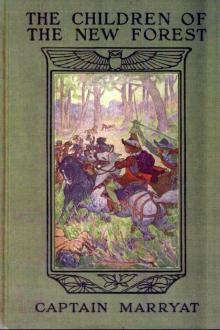 The Children of the New Forest
The Children of the New Forest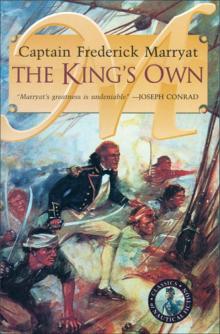 The King's Own
The King's Own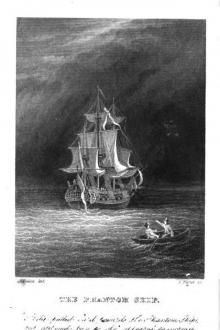 The Phantom Ship
The Phantom Ship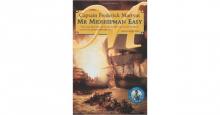 Mr. Midshipman Easy
Mr. Midshipman Easy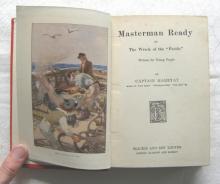 Masterman Ready; Or, The Wreck of the Pacific
Masterman Ready; Or, The Wreck of the Pacific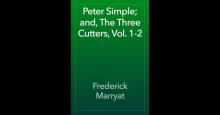 Peter Simple; and, The Three Cutters, Vol. 1-2
Peter Simple; and, The Three Cutters, Vol. 1-2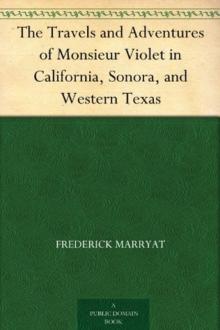 Travels and Adventures of Monsieur Violet
Travels and Adventures of Monsieur Violet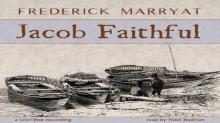 Jacob Faithful
Jacob Faithful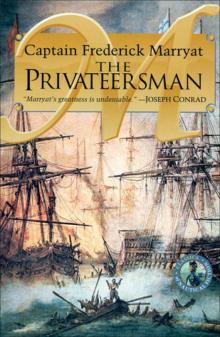 The Privateersman
The Privateersman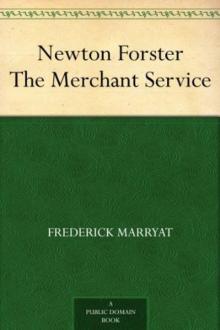 Newton Forster
Newton Forster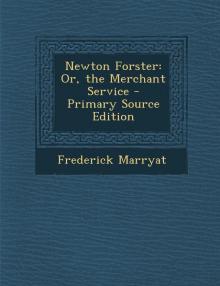 Newton Forster; Or, The Merchant Service
Newton Forster; Or, The Merchant Service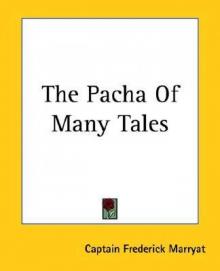 The Pacha of Many Tales
The Pacha of Many Tales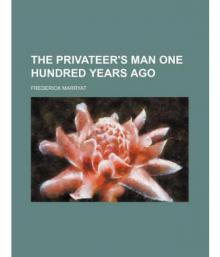 The Privateer's-Man, One hundred Years Ago
The Privateer's-Man, One hundred Years Ago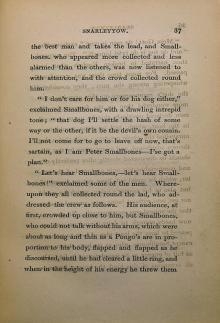 Snarleyyow, or, the Dog Fiend
Snarleyyow, or, the Dog Fiend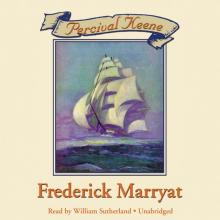 Percival Keene
Percival Keene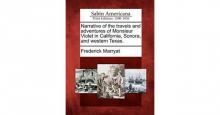 The Travels and Adventures of Monsieur Violet in California, Sonora, and Western Texas
The Travels and Adventures of Monsieur Violet in California, Sonora, and Western Texas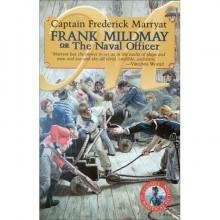 Frank Mildmay; Or, the Naval Officer
Frank Mildmay; Or, the Naval Officer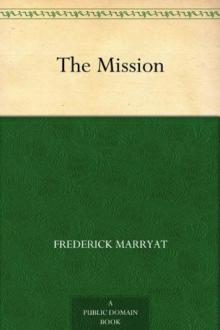 The Mission
The Mission